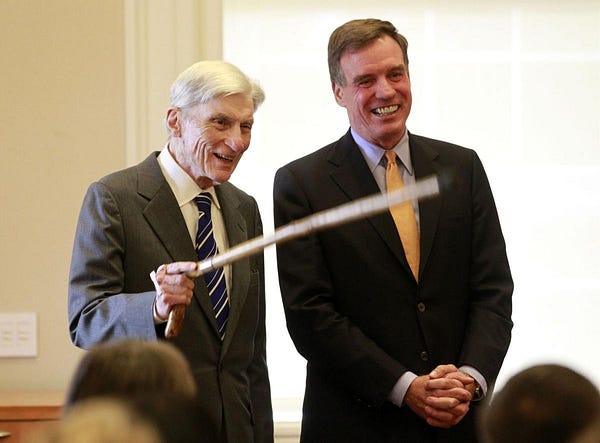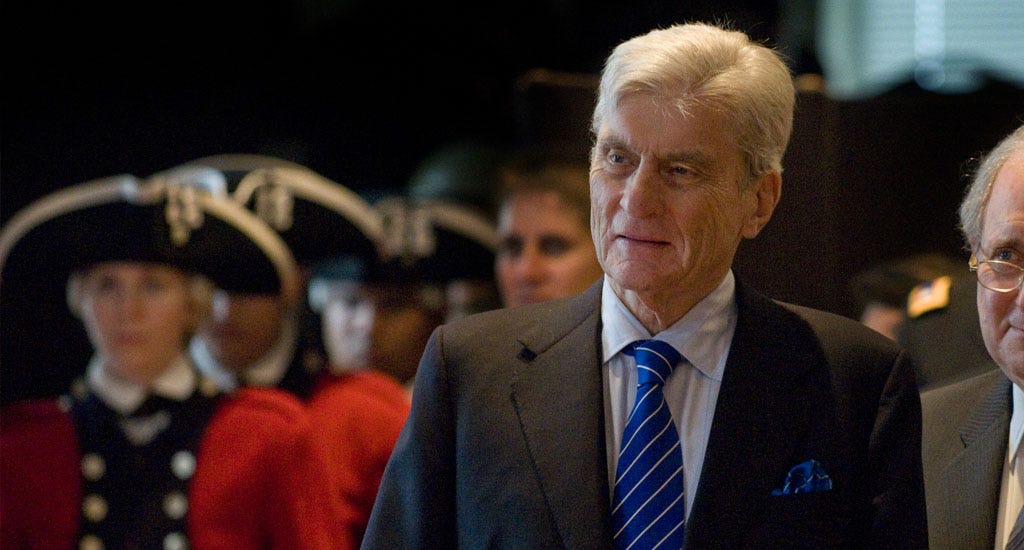Sophrosyne is the greatest virtue, and wisdom is speaking and acting the truth, paying heed to the nature of things…
— Heraclitus, Fragment 122
My first encounter with John Warner was in 2002 during his re-elect campaign — hardly a blip in the final analysis — after a bruising 1996 race against a former businessman and a capital startup investor by the name of Mark Warner.
As chairman of the Fredericksburg GOP, the senator — Warner was always “the senator” because who else could it be? — was running a bit behind. So I paced a bit until he arrived, a stooped and kindly gentleman much different than the pictures you saw in the campaign ads, a man whose body was worn down by time but whose spirit was a sharp as ever.
We talked outside for perhaps two minutes. Warner’s face lit up in the politician’s style, we talked about my family and a bit about my grandfather (whom he knew). For most seasoned politicos, we know what happens next — staff hurries the candidate in, the candidate speaks, and the candidate hastily withdraws to the next event.
Not John Warner.
I’ll never forget, and I doubt I fully understand why this left such an indelible impression, but his staff went ahead. Warner wanted to be seen walking into the unit committee meeting with me. Not the other way around. Me. So we walked in together and Warner gave his speech, sprinkled references to yours truly, shook hands and left the Rappahannock Library with a smile and a reluctance.
Now that is how it is done, I thought to myself.
So it is with sad news that Virginians hear former US Senator John Warner passed away last night at the age of 94, and it is a uniquely Virginian lament if for no other reason than Warner was indeed one of us — a Virginia gentleman in the old style. Frustrating at times in his moderation, few questioned his sincerity or his quality.
Jeff Schapiro with the Richmond Times-Dispatch broke the news this morning:

US Senator Tim Kaine (D-VA) offered his condolences with a rather touching vignette:
Shortly after I was elected to my first term, I asked John to lunch in the Senate Dining Room. He hadn’t been in many years. When he walked into the room, the place absolutely lit up, and a steady stream of Senators and Senate staff made a path to the table to visit with a person they loved so much.
John and I once talked about how the Senate of today was more partisan and less relationship-based than during his years of service. But at the end of our conversation, he told me: "But Tim, it’s not in the water supply or sick building syndrome. It’s in the character and priorities of the people who walk into the building every day. So you have a chance to walk into the Capitol and make it better each day."
US Senator Mark Warner (D-VA) — clearly no relation, but we have to remind folks from time to time — also offered his condolences:


For those in the Charlottesville area, Warner was a known figure. Professor Larry Sabato shared his sentiments as to what Warner meant to the University and to the students:

Of course, many are remarking on Senator Warner’s place on the center-right with an emphasis on the center this morning. Such talk strikes me as a touch abbreviated. While Warner was known for his moderation, it wasn’t for its own sake. Rather, Warner had an ideological core that had far deeper roots than most realize, though his introduction and his mention in conservative circles will always be linked to the name of Dick Obenshain.
While Warner was a conservative when it came to national defense and played team ball — both as Secretary of the Navy under President Nixon and on Senate Armed Services alongside President Reagan, his 1978 run for the Republican nod for US Senate was a second-place finish behind Obenshain, a conservative stalwart and committed anti-communist who tragically died in a plane crash during his campaign run. Warner would be selected by the Republican Party of Virginia’s State Central Committee to run and ultimately defeat Democrat Andrew Miller, then hold the seat for five consecutive terms — the only Virginia Republican ever to win re-election for the US Senate. The might-have-beens and what-could-have-beens are reserved for those 20 years older than myself, yet reflects on Warner’s career and how narrow the space is between a successful three decades in Washington as opposed to a glittering career at a prestigious law firm. Such are the wheels of fortune, friends.
Warner’s position on other issues broke from conservative orthodoxy. Warner perhaps most famously earned the ire of conservatives by voting against the nomination of Judge Robert Bork in 1987. While Warner supported abortion legislation, though he consistently won high marks from pro-regulation groups such as National Right to Life for working to limit the impact of Roe v. Wade. Warner supported marriage and the family, but hesitated at a federal marriage amendment as too restrictive. In this, Warner never apologized for his disagreement with social conservatives, but was rarely disagreeable in doing so and did not mind being challenged in the public square when warranted.
Yet on issues of national defense, Warner’s leadership not only made America strong but kept Virginia in the vanguard. Hampton Roads enjoyed the patronage of Virginia’s senior senator tremendously, keeping the largest deep water port on the Eastern seaboard the very center of US naval shipbuilding. Northern Virginia saw road improvements, including $1 billion in earmarks for the construction of the new Woodrow Wilson Bridge.
What set Warner apart for such bi-partisan praise was not necessarily his ability to break ranks with Republicans but in his independence from the fray. Warner’s financial independence — though not a wealthy man — allowed him to maintain himself in the true tradition of a Virginia gentleman. Warner was not a calculating politician, but a rock during changing times.
Too often, perhaps, we find Republicans willing to cave to Democratic shibboleths in order to be seen and praised as statesmen. Warner’s idea of conservatism was not in the tradition of either Reagan or Nixon, but more in the tradition of another and perhaps more forgotten Virginia Republicanism — that of John Marshall of Roanoke:
"Is it necessary for men at this time of day to make a declaration of the principles of the Republican party? Is it possible that such a declaration could be deemed orthodox when proceeding from lips so unholy as those of an excommunicant from that church? It is not necessary. These principles are on record; they are engraved upon it indelibly by the press and will live as long as the art of printing is suffered to exist. It is not for any man at this day to undertake to change them; it is not for any men, who then professed them, by any guise or circumlocution to conceal apostasy from them, for they are there -- there in the book. . . What are they? Love of peace, hatred of offensive war, jealousy of the state governments towards the general government; a dread of standing armies; a loathing of public debt, taxes, and excises; tenderness for the liberty of the citizen; jealousy, Argus-eyed jealousy, of the patronage of the President."
-- John Randolph of Roanoke, speech before the U.S. House of Representatives regarding the "Tertium Quids" Republicans as reported by the Richmond Enquirer (1813)
In this, one detects in John Warner the spirit of the tertium quids and the Jeffersonian Republicans. Peace before war; peace through strength; liberty of the citizen over the dictates of Washington.
If the legacy of Senator John Warner is to be anything, it is to be the legacy of men such as John Randolph of Roanoke and contemporaries such as Russell Kirk. Warner was no moderate for moderation’s sake, but in the Greek tradition of σωφροσύνη or sophrosyne embraced a more principled opposition to that great destroyer of representative governments: hubris of which we find so much of in today’s political environment.
Warner’s legacy survives indelibly in places such as the University of Virginia and the Warner Center for Advanced Military Studies for the US Marine Corps at Quantico, Virginia. The Virginia-class USS John Warner patrols the seas. These are no small things.
Yet for the hundreds of staffers on Capitol Hill who passed under his mentorship, the legacy of Senator John Warner will not be in brick and mortar, but in an example demonstrating that the qualities of a Virginia gentleman and Virginia republicanism are neither dead nor slumbering, but very much alive and well in a way even the loyal opposition recognizes and respects during bitter and tumultuous times.
No greater honorific could be bestowed to a Virginian than one who preserves the best spirit of our traditions with a style of leadership transcending the political chasm of our times. For that alone, Senator John Warner should be remembered and respected.
Requiescat in pace, Senator Warner.
Shaun Kenney is the editor of The Republican Standard, former chairman of the Board of Supervisors for Fluvanna County, and a former executive director of the Republican Party of Virginia.





